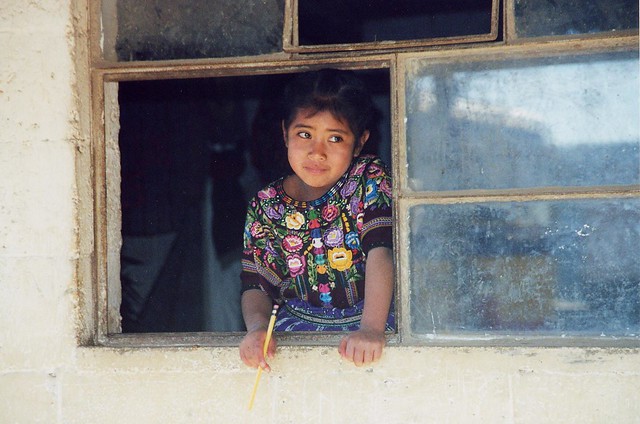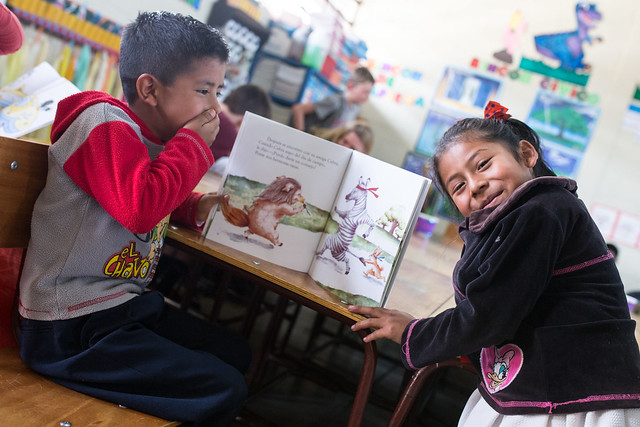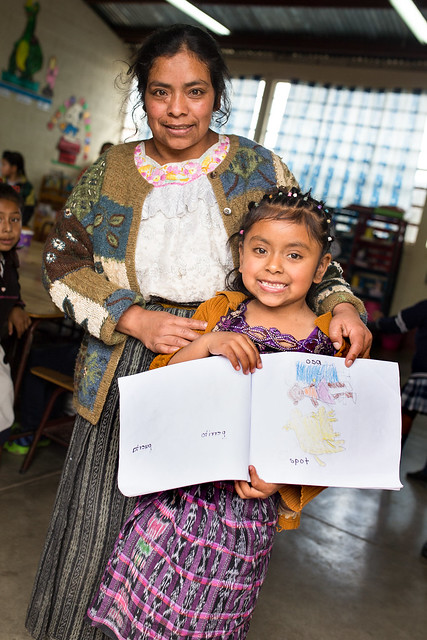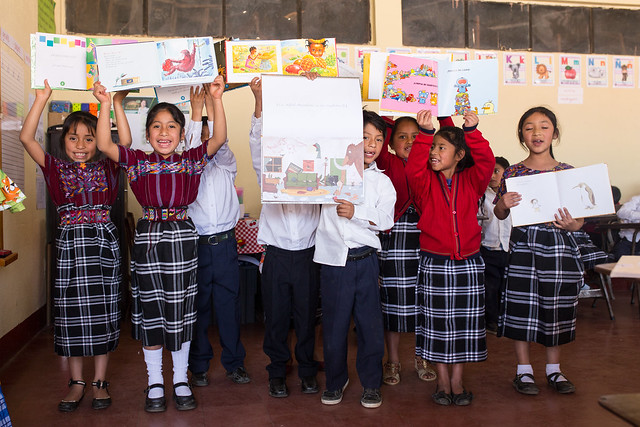Before the Culture of Reading Program (CORP) arrived at Agua Dulce school, Dora María’s classroom looked like most other first- and second-grade classrooms in rural Guatemala. There were no storybooks, just a whiteboard and some markers. Dora María used the teaching techniques she had learned while studying teaching in high school, which is all the training that is required of primary school teachers in Guatemala. “They would just copy and copy and copy,” she says.
Her students, fresh-faced seven- to ten-year-olds, would slump in their seats, smiles fading as they gamely tried to quell their energy and force themselves to write the same word 25 times on a sheet of paper. “They got bored and tired,” says Dora María. “Before [CORP], it was always, ‘the teacher, the teacher, the teacher.’ I’ve been teaching for 16 years, and I can tell you that it used to take students up to two years to learn to read well. But now it’s more the students [who direct the learning process] than it is us. We dedicate ourselves to giving them the techniques, tools, and materials that they need, and they are in charge of the learning process. They aren’t scared anymore—they’re not timid, they’re not ashamed—and they learn so much faster. Now they reach the same level in three months. After three months, they are already interpreting and analyzing texts.”
Thanks to CORP, Dora María’s room is now filled with colorful storybooks, and she acts as a facilitator of the learning process. Her students take turns reading aloud, raising their hands and bouncing in their seats as they yell, “Me! Me! Me!” They decorate puppets and costumes to act out the stories that they’ve read, and use their creativity to write and illustrate their own stories based on the same themes. They swap their stories—reading to and learning from each other, then take those stories home to read to their parents and younger siblings.
“Before, parents just told their kids to do their copying, and that was it. But now they sit down to read with them,” says Dora María. “I’ve had students who have taught their mothers to read and write. Because I tell them: ‘If your children are learning, you can too! Sit down with your child in the afternoon and ask them to teach you what they learned at school that day.’ It helps the kids so, so, so much. And a lot of the mothers of my first graders have stopped saying to me, ‘Teacher, I don’t know how to sign this.’ Now they say, ‘Teacher, I can sign this now. I can do this now.’”
CORP has even enabled Dora María to help students like ten-year-old Antony, who had to repeat first grade four times because he has a learning disability, and his teachers didn’t have the tools to help him. “Last year he was completely focused on being disruptive,” says Dora María. “But this year he is getting better. He loves to see new books, read new stories, and participate. He’s a great collaborator now! I’ll say, ‘Antony, will you do me a favor and read the title of this book?’ ‘Teacher!’ he’ll say to me. ‘Of course I can!’ So I’ll read it once and then he’ll repeat. Or I’ll say, ‘Will you help me pass out the scripts?’ ‘Okay,’ he says. He is always my helper. Now that he’s able to help, he has so much motivation.”
Dora María has also helped Antony start to read on his own. “I am working with him individually, using a new technique that they just taught us [in the CORP trainings]. He’ll grab a book and look at it, then ask his friends, ‘What does it say here?’ because he wants to know! And I tell him: ‘If you want to know, you’ll have to learn.’ He’ll say, ‘Okay, teacher. I want to learn. I want to pass.’ We’re advancing—a bit slowly, but we are advancing. He is really happy now because he has finally started to learn.”
THANK YOU for supporting Dora María and her students through CORP. Thanks to people like you, classrooms across Guatemala have become vibrant, joyous places just like this one, and thousands of students are learning to raise their hands and say, “I want to learn!”





